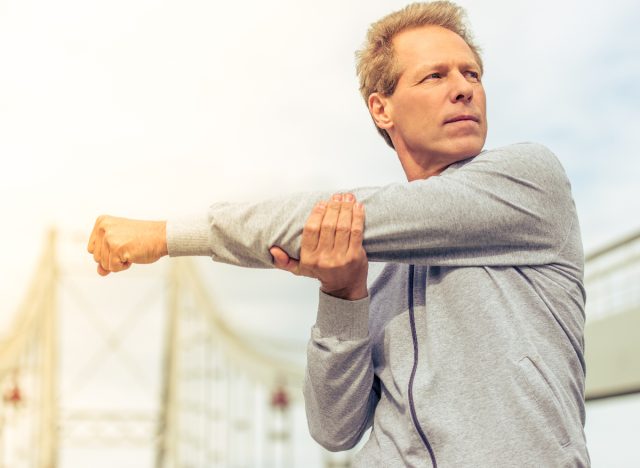These 5 Exercise Habits That Destroy Your Body After 50 – Regular exercise is a crucial part of the process if you want to stay healthy, strong, and mobile as you age. However, it’s important to note that not all exercise is created equal. If you want to maximize your longevity, there are certain exercise habits you should avoid at all costs. We’re here with five exercise habits that can destroy your body after 50, so listen up closely.
Making the following mistakes over time means missing out on the multitude of benefits from exercise as a whole when properly programmed. According to research, engaging in physical activity such as resistance training can decrease or even reverse certain natural occurrences that happen with age, such as the loss of bone density and muscle mass, reduced balance, increased risk of falls, and decreased mobility. These are all things you want to delay or avoid for as long as possible so you can continue to lead the independent life you love.
Keep reading to learn all about the below exercise habits that destroy your body after 50. And when you’re finished, be sure to check out the 7 Balance Exercises a 60-Year-Old Yoga Instructor Does For Peak Mobility.
You’re not warming up before workouts.
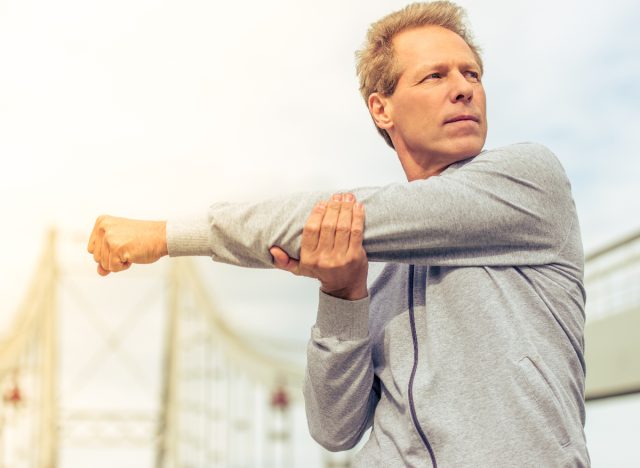
Skipping warm-ups may hit a little too close to home. However, even when you feel like your time is slim, not warming up or cooling down can do your body a major disservice.
“Skipping a proper warm-up increases the risk of muscle strains or injuries—especially as the body’s flexibility and blood circulation decrease with age,” explains Ronny Garcia, CPT, Blink Fitness. “Dedicate time to a dynamic warm-up with light aerobic exercise and dynamic stretches before moving on to more intense activities.”
You’re doing too many high-impact activities.
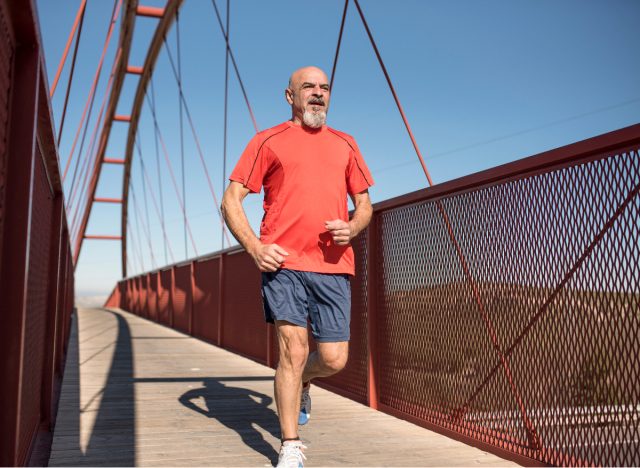
High-impact activities and exercises such as burpees, running on hard surfaces, and jump squats have their place, but beware they can also put unnecessary and excessive stress on your joints. Garcia suggests opting for low-impact exercises like cycling, swimming, or exercising on the elliptical instead.
You’re overtraining.

Pushing your body to the limit won’t speed up your progress; rather, it can set you back. “Excessive training without the proper rest period can lead to fatigue, increased risk of injury, and even a weakened immune system,” explains Garcia. He stresses the importance of rest and recovery days and being in tune with your body.
You’re not using the correct form.
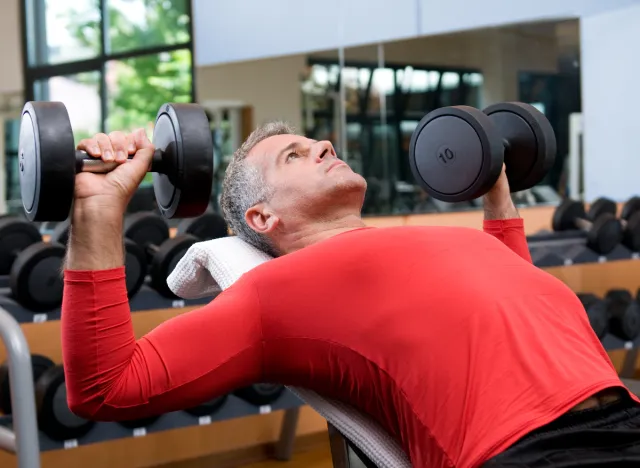
“Incorrect form and poor posture during exercise can cause strain on the spine and joints, leading to potential injuries,” Garcia tells us. Make sure you’re prioritizing proper form and technique. When in doubt, it’s always a smart idea to work with a personal trainer to ensure you have your form down pat.
You’re avoiding the weight room.
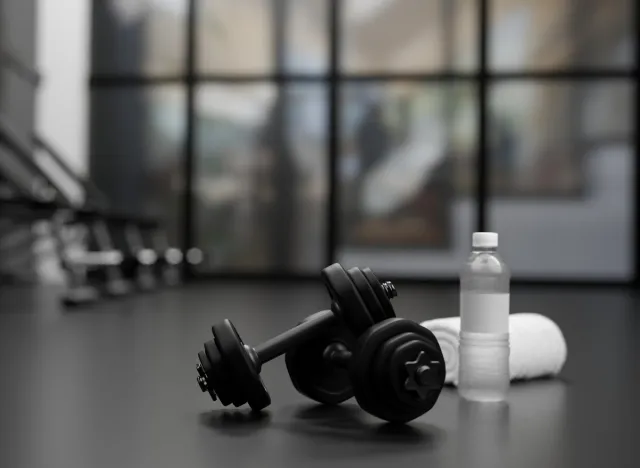
If you’ve been intimidated by the weight room in the past, you are not alone. Nevertheless, lifting weights is a very important part of any fitness program designed to slow or reverse the aging process.
You need to lift weights that are challenging for a low number of repetitions. They should feel heavy relative to your current strength. I recommend to all my 50-year-old and older clients that they perform sets of six to 12 repetitions using a weight that leaves one to repetitions “in the tank” after the first set.
You’re skipping mobility work.
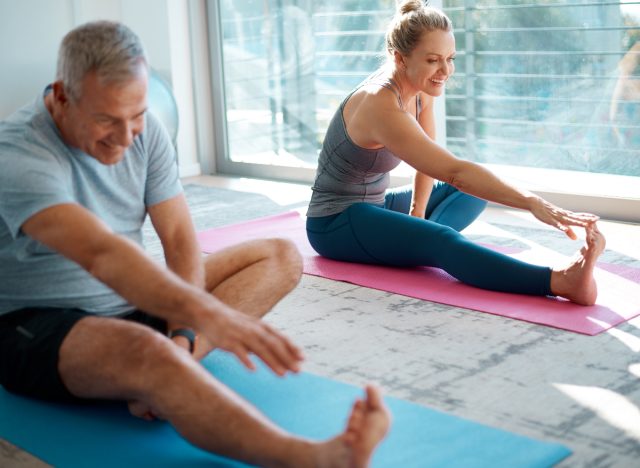
Mobility is a vital component of reducing injury and ensuring your joints maintain a normal, functional range of motion. Mobility can include things like yoga, massage, foam rolling, stretching, and any other activities that incorporate some form of stretching or elongation of the muscles.
We usually recommend active forms of stretching such as yoga as opposed to passive stretching, but both have benefits. Incorporate 30 to 60 minutes of mobility activities three times per week in conjunction with your weight training for maximum benefits.
You’re focusing too much on isolation movements.
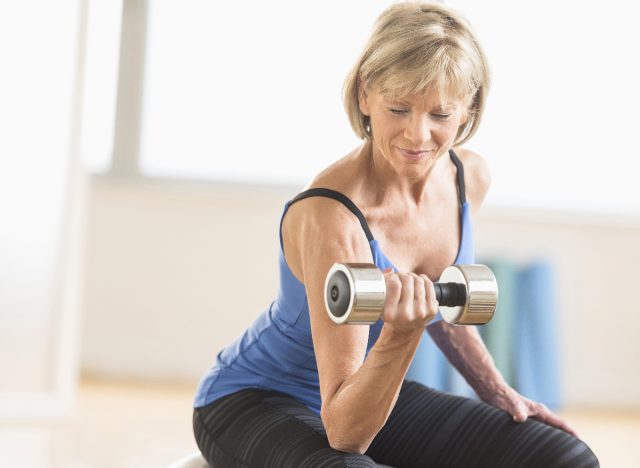
If you’ve been convinced to lift weights, you still need to use the right movements. Too often, clients are focused on isolation exercises such as biceps curls, triceps extensions, and leg extensions. While this type of weight exercise has a place in training, the focus should be on compound movements that load multiple muscles and joints.
In particular, be sure to include weighted movements like squats or deadlift variations that load the spine vertically. These provide the most benefit in terms of bones, muscle, and performance improvements.
You’re only walking on stable surfaces.
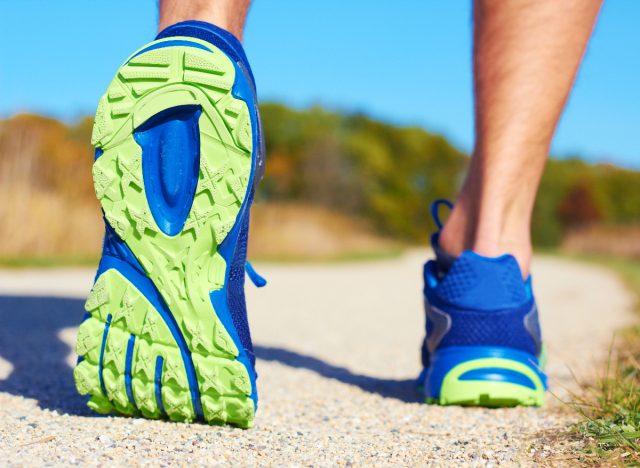
Walking is a great addition to weight and mobility training. However, if you only walk on paved surfaces, you are missing out on some serious benefits. You may also risk aggravating your joints if the surfaces are always paved.
Walking on uneven surfaces such as sand, trails, rocky terrain, and other unpaved surfaces helps improve your balance and ankle strength while reducing the impact on your joints.
You’re skipping exercise altogether.

By far the absolute worst thing you can do is skip exercise altogether. While the best exercise programs for people 50 and older would follow the above recommendations, doing anything is always better than doing nothing. Short walks, cardio machines, taking the stairs, and other activities are still worth shooting for even if weight training, yoga, and other methods are off the table. Take a walk and do some stretches at the very minimum. Your body will thank you now and later.
A version of this story was originally published in March 2023. It has been updated to include new information and more exercise habits.

